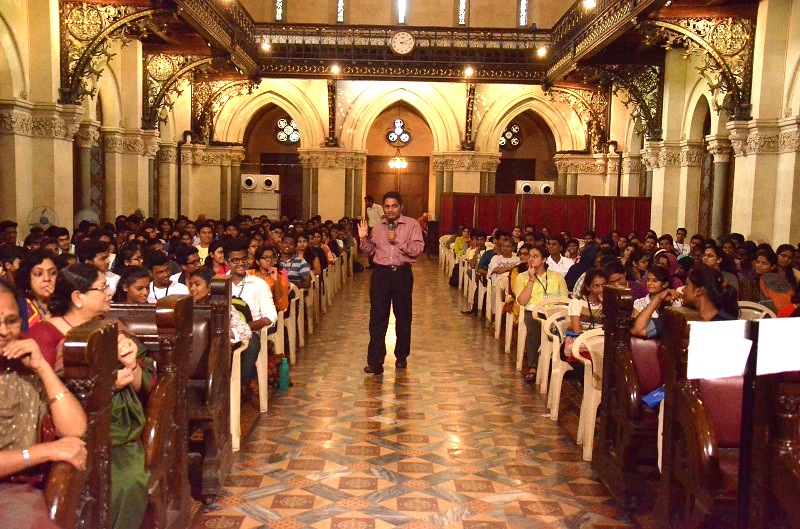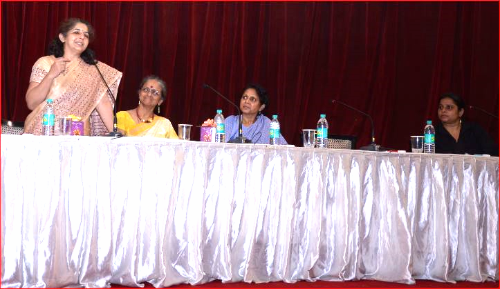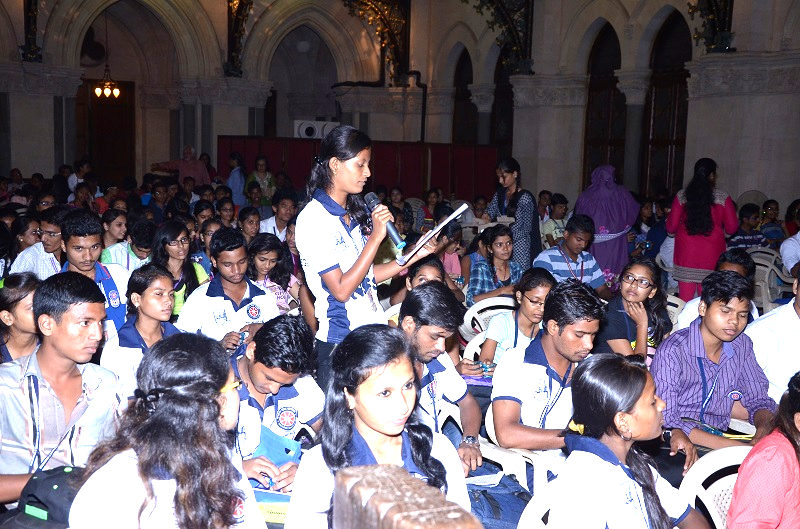On 10 September, in the Convocation Centre of Mumbai University, an eager audience of over 400 gathered to commemorate International Suicide Prevention Day. It was a power-packed program, organized by Sisters Living Works in collaboration with Mumbai University. Highlights of the program included a panel discussion led by distinguished professionals from the mental health community, a documentary on the experiences of those who have lost loved ones to suicide and a candle lighting ceremony in memory of those who have lost their lives to suicide.
After Anuradha Karegar gave a warm welcome to the attendees, the program was kicked off by Ms. Gayatri Datta, the founder of Sister Living Works. Ms. Datta shared her personal loss and experience with suicide, and how that motivated her to start the organization and work in this area. She underlined the alarming statistics of suicide in India. According to the National Crime Records Bureau in 2012, suicide is one of the leading causes of death of young people. She briefly highlighted that societal taboo and stigma are the biggest hurdles, which prevent the vulnerable from getting the help they need. She elaborated on the mission of Sisters Living Works, which has created safe spaces for discussing suicide and suicide prevention, in a society that believes that thinking, talking, attempting or dying by suicide is a sign of weakness. Ms. Datta emphasized that she hopes to raise awareness and provide suicide prevention information to the public. She believes that these efforts will not only fight stigma, but educate and encourage the realization that suicide is a preventable public health problem.Dr. Harish Shetty, a psychiatrist with Hiranandani Hospital, engaged the audience by explaining the characteristics of those who may be vulnerable to suicide. Using relatable, practical examples, he discussed warning signals in their peers. He talked about the need for “Mental Health Soldiers,” and asked those present to join his army. He talked about how communication and giving people space to cry is a great way for those in emotional pain to share what they are going through. “Hearts don’t open with words only, but they do sometimes with silence.” Dr. Shetty emphasized the importance of being non-judgmental, and that physical appearances can be deceptive, noting that “Depression is invisible and not measurable.” He debunked many common suicide myths, noting that being vulnerable to suicide has nothing to do with weakness or strength of one’s character. He emphasized that although you may not be able to “change” a situation for someone, you can still reach out and help by just listening. For example, if financial issues are a reason for contemplating suicide, “you may not be able to give money, but you can give company and be supportive.” He urged all participants to be proactive and reach out to those who are vulnerable.
 Dr. Shetty, engaging with the audience and building an army of Mental Health soldiers
|
The second panelist, Dr. Mrunal Marathe, an expert in Health System Studies, shared her field experiences. Over the years, she has worked with individuals struggling with physical ailments such as burns, thalassemia, and AIDs. She shared that while battling their diseases, these individuals also struggled with what their roles are in life. They were labeled as “diseased persons”, not persons with a disease, which made it even more difficult for them to cope. In her explorations of the internal thoughts and dialogues of those contemplating suicide, she found that there were some commonalities. Many of them believed that it is not worth living anymore; that no one cared; a constant fear of being labeled; and guilt about medical expenses (especially seen in women). Dr. Marathe talked about how important it is to be nonjudgmental when reaching out to someone. She concluded her discussion by asserting that “It is important to be vigilant and aware, and let those around us know that we are there for them, since we live in a world that is low on love, and high on technology.”
Mrs. Sulabha Subramaniam, a counsellor associated with Institute of Psychological Health, Mumbai, India shared her experiences as a counsellor, and discussed factors leading to suicidal ideation and suicide. She talked about how suicide is gender neutral, and cuts across ages, caste, creed and geographical boundaries. In a rapidly evolving society, changing lifestyles, stages, and family structures, there is a gap between expectation and reality. Some predisposing factors for suicide are stress, work-life imbalance, neurochemical and hormonal imbalance, mental health conditions, and broken romantic or familial relationships. Mrs. Subramaniam urged everyone to break the conspiracy of silence in which suicide is shrouded. She also shared how one could engage in better self-care, such as getting involved in enjoyable activities, paying attention not only to physical but emotional needs, and the importance of setting reasonable expectations of oneself, and life. Like the speakers before her, she also believed that mutual love and care are imperative to cultivate in all inter-personal relationships.
 Left to Right: Dr. Mrunal Marathe, Health Systems expert, Sulabha Subramaniam, Counsellor with IPH, Gayatri Datta, Founder of Sisters Living Works and Advocate Aileen Marques
|
Advocate Aileen Marques shed light on the legal status of mental health in India. Even though mental health is a public health issue, there are no laws in the country to promote it. In explaining the laws that affect suicide, she gave a brief history of Section 309 of the Indian Penal Code, which initially listed suicide or attempt to die by suicide as a criminal act, for which a person could be jailed, fined or both. As a result, people took extreme measures to ensure that their suicide attempts would be successful. In 2014, suicide or attempt to die by suicide was removed from the list of crimes. Ms. Marques noted that laws should not just focus on the criminal aspects of suicide, but instead focus on aftercare programs for those who have attempted suicide.
Mr. Rangnekar, from Samaritans Helpline for suicide prevention, shared how the trends of calls received by helpline mirrors the trends in society. About a decade ago, the average age of their callers was between 45-60 years, which was also the age group with the highest rate of suicide. However, in the last few years, the average age of the callers has become much younger 18-35 years, which mirrors the age range with the highest rate of suicide. The helpline currently receives almost 3 times as many calls on a daily basis than it did 5 years ago, and many conversations continue for a much longer period. Mr. Rangnekar believes that the younger generation although they face unique stress and challenges demonstrates many positives qualities, such as open-mindedness, intelligence and energy. He encouraged the participants to work towards helping the younger generation to support each other.
During the brief open-mike session, several interesting topics pertaining to self-care such as yoga and the importance of cultivating spiritual awareness in the youth were raised. Some participants were so moved by the discussion that they composed poems on the spot and shared them as well. A few shared personal experiences with suicide.
 Right: Sharing a poem during open mike
A documentary from The American Foundation for Suicide Prevention took the audience through the journey of grief, emotional healing and forgiveness, of those who lost loved ones to suicide. The program ended with a moment of silence for those who have been lost to suicide. It was a somber, reflective moment that gave all present a chance to remember and honor the lives lost to suicide. The participants left the Convention Center with knowledge and tools for a life-long mission…to communicate, be aware, reach-out and save lives.

|
|
|
|

